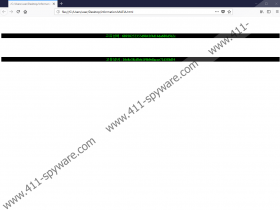Korean MAFIA ransomware Removal Guide
It does not matter which language a ransomware program uses. A ransomware infection is a ransomware infection, and so Korean MAFIA ransomware is nothing else but another malicious intruder that wants your money. Of course, this program might take you by surprise if you do not speak Korean, but it doesn’t take a polyglot to understand that something is very wrong when this program enters your computer.
It is clear that you have to remove Korean MAFIA ransomware from your computer, and that is not so hard to achieve. However, you may have to say good-bye to your files if you do not have an external system backup.
Judging from the interface language and the programs it blocks, Korean MAFIA ransomware seems to have been developed to target specifically Korean computer users. However, it doesn’t mean that users from other countries cannot get infected with it. If you are exposed to the same distribution channels, you might as well get infected with Korean MAFIA ransomware, too.
Judging from what we know, this program should be spreading through phishing attacks. It means that users tend to open random phishing emails that land in their inbox. Perhaps we are too used to opening whatever we receive. It should be clear that one has to be careful about opening mails from unfamiliar senders, let alone downloading attachments or clicking embedded links. Unfortunately, quite a few users do that without any second thought, and so the likes of Korean MAFIA ransomware manage to slither into target systems.
Perhaps the main problem with this infection is that it has not been fully developed yet, so even if the infected user had any intention to transfer the ransom fee, it would not be possible. The only thing that appears on your screen is a blank page with your (supposedly) infection number at the top of it. So it does not give any type of method that would allow you to regain the affected files.
What’s more, the encryption itself is very slow because Korean MAFIA ransomware uses the OpenSSL AES-256 algorithm in CBC mode to encrypt the target files. Since the encryption process itself is really slow, users can actually notice it, and kill the encryption process before it is complete. To do that, you need to open the Task Manager and terminate the winlogin.exe process from the list of the running processes.
On the other hand, if you are not adept at using your system utilities, you may not be able to stop Korean MAFIA ransomware from encrypting your personal files. If that happens, your best option at retrieving your data is via an external backup. Such malicious infections are the main reason computer security experts maintain that it is extremely important to make copies of your files, and then keep them on an external hard drive that cannot be affected by the infection.
If you do not have a file backup, you may have to start working on your data library anew. However, before you start doing that, do not forget to remove Korean MAFIA ransomware from your computer.
How to Remove Korean MAFIA ransomware
- Delete the most recent files from your Desktop.
- Go to your Downloads folder.
- Remove the most recent files.
- Press Win+R and type %TEMP%. Click OK.
- Delete the most recent files.
- Scan your PC with SpyHunter.
Korean MAFIA ransomware Screenshots:

Korean MAFIA ransomware technical info for manual removal:
Files Modified/Created on the system:
| # | File Name | File Size (Bytes) | File Hash |
|---|---|---|---|
| 1 | b5877b20760ce7c307567083703d423e80aad1c6c342fc2318ddbe20c3322170.exe | 116224 bytes | MD5: 67b320b4e8e1e37ec33954d7b1917aae |
Memory Processes Created:
| # | Process Name | Process Filename | Main module size |
|---|---|---|---|
| 1 | b5877b20760ce7c307567083703d423e80aad1c6c342fc2318ddbe20c3322170.exe | b5877b20760ce7c307567083703d423e80aad1c6c342fc2318ddbe20c3322170.exe | 116224 bytes |

